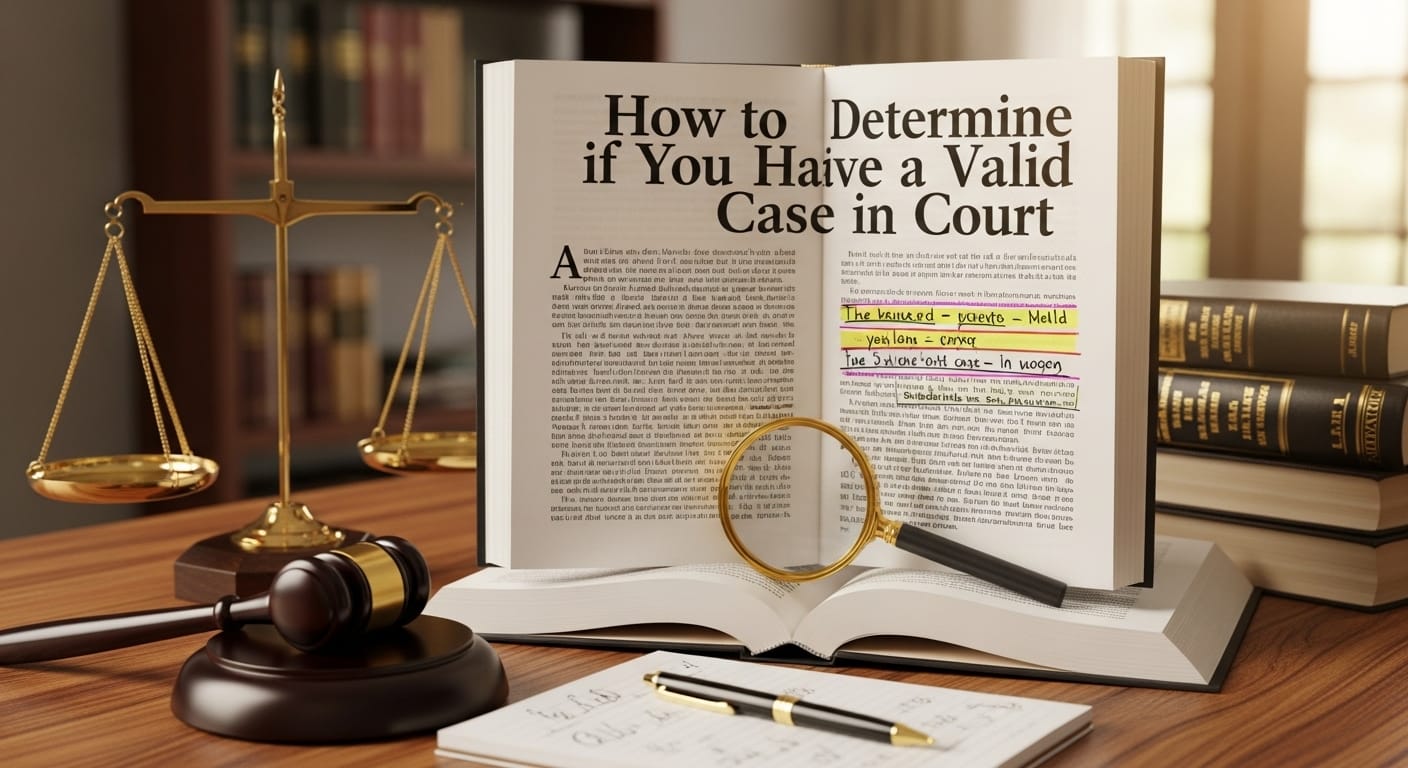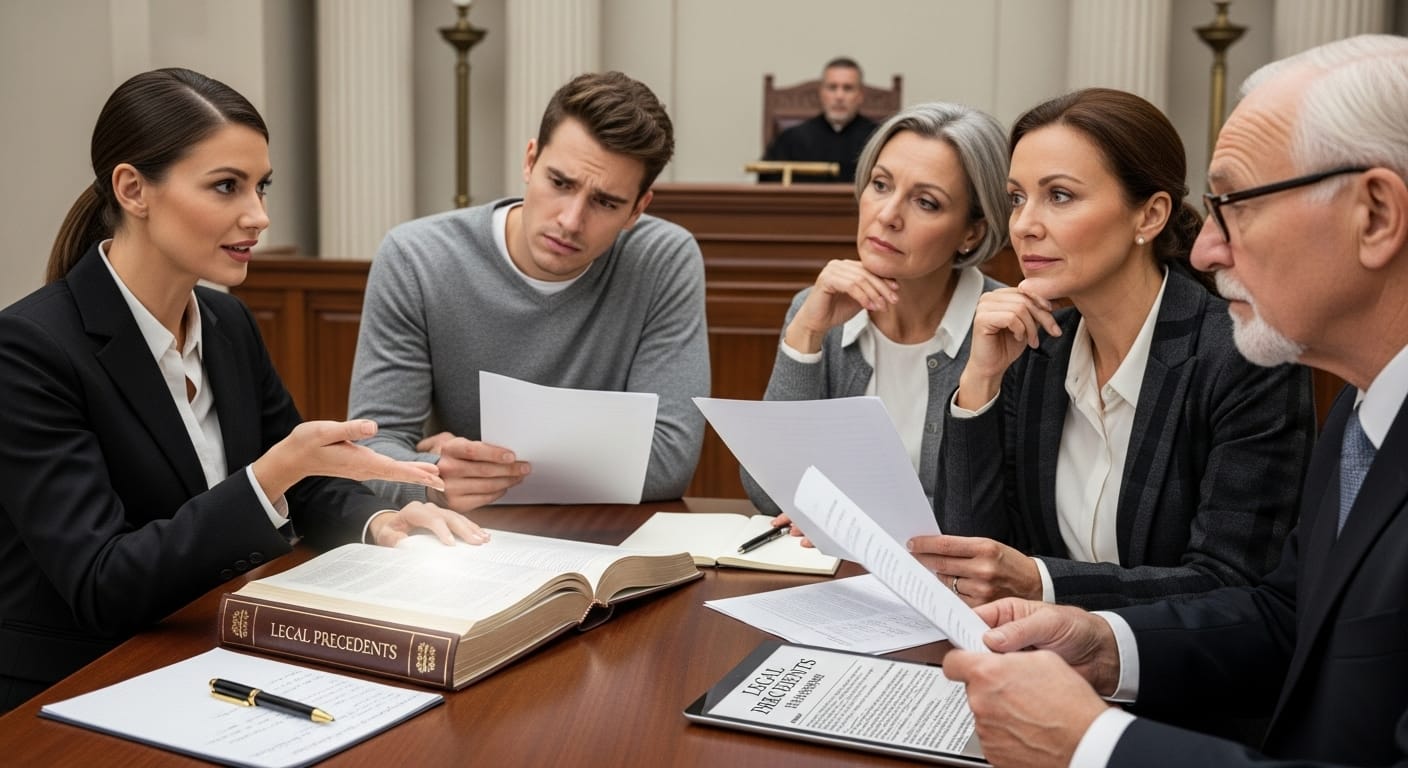So, you’ve had an unfortunate run-in with life—maybe your neighbor’s tree fell on your car, or perhaps you slipped on what can only be described as the world’s greasiest floor at that new restaurant.
Now you’re wondering: Do I have a valid case? Can I sue? Will my lawyer charge me in pizza slices? Well, let’s dive into this question together and find out!

Top Takeaways and Key Concepts
Understand Your Situation: Document all details, witnesses, and circumstances to evaluate potential legal action.
Identify Legal Grounds: Determine if negligence, breach of contract, or tort applies to your case.
Gather Evidence Thoroughly: Collect photos, receipts, medical records, and witness statements to support your claim.
Assess Damages: Calculate financial, medical, and emotional impacts to show actual losses suffered.
Consult a Lawyer and Weigh Options: Seek professional advice and consider mediation versus litigation before proceeding.
Summary of This Article
The article explains how to determine if you have a valid legal case by analyzing circumstances, establishing legal grounds, and gathering solid evidence. It emphasizes documenting all damages, both financial and emotional, to strengthen a potential claim. Consulting an attorney is advised to clarify legal options, assess the likelihood of success, and explore alternatives like mediation. Ultimately, the article guides readers to make informed decisions about pursuing legal action based on practicality, evidence, and potential outcomes.
Understanding Your Situation

First things first, it helps to understand exactly what happened. Was it an accident or was there some negligence involved? Imagine you’re playing dodgeball (the ultimate test of agility and friendship).
If someone throws the ball at you intentionally and hits you in the face—that’s one thing. But if they accidentally miss their target while trying to avoid hitting someone else, well, that’s a whole different ballgame.
To figure out if your situation is worth pursuing legally, start by writing down all the details. What happened? Who was involved?
Were there any witnesses who saw your epic battle against gravity when you slipped on that banana peel? The more information you gather now, the better prepared you’ll be later.
Honestly, I once thought about suing my friend after they “accidentally” spilled soda all over my favorite T-shirt during movie night. Spoiler alert: It wasn’t worth it! But documenting everything helped me realize how silly that idea was.
Legal Grounds: What Are They?
Next up is understanding legal grounds for your case. This is where terms like “negligence,” “breach of contract,” or “tort” come into play—yes, torts are not just desserts! To have a valid case, you generally need to prove that someone else acted irresponsibly or failed to uphold their end of a deal.
For example, if someone borrowed money from you and then ghosted faster than a bad date, that might fall under breach of contract. On the other hand, if they accidentally ran over your prized garden gnome while reversing their car—now we’re talking potential tort action!
By the way, don’t forget about statutes of limitations; these are laws that limit how long you have to file a lawsuit after an incident occurs. So, if you’re thinking about filing suit because someone took your parking spot last week… well good luck with that!
Gathering Evidence Like Sherlock Holmes
Now comes the fun part: gathering evidence! Think of yourself as Sherlock Holmes but without the fancy hat (unless you’re into hats). You’ll want proof to back up your claims.
This could include photos from the scene (like those majestic gnome remains), medical records if injuries occurred, receipts for damages—and yes—even witness statements.
Interestingly enough, I learned this lesson when I tried claiming damages after tripping over my own shoelaces at a public event (lesson learned!). Had I documented my “injury” with pictures and witness accounts from friends who were laughing hysterically nearby—I might have had something more substantial!
Keep in mind that evidence should clearly show how another party was responsible for what went wrong in your life. Without solid proof backing up your story—it becomes harder to convince anyone (including judges) that you’ve got a legitimate case.
Assessing Damages: Show Me The Money!
Okay folks—let’s talk dollars and cents! If you’ve determined there’s been wrongdoing on someone’s part—you’ll also need to consider whether you’ve suffered actual damages as a result. In legal speak, damages refer to losses incurred due to another person’s actions—like medical bills or lost wages.
Let’s say our friend with the rogue tree caused damage not only to your car but also left you unable to work for two weeks because you were busy figuring out how many ways one can complain about insurance companies (hint: it’s quite a few). That’s where calculating those financial impacts comes into play!
To be fair though—just wanting money isn’t always enough; courts usually require hard evidence showing how much impact this has had on your life financially and emotionally too! So, keep track of everything related—from doctor visits down through therapy sessions discussing why people shouldn’t plant trees so close together.
Consulting With A Lawyer
At this point in our journey towards possible litigation glory—or at least compensation—it might be wise to consult with an attorney specializing in personal injury law (or whatever type applies here). These legal wizards know all sorts of ins-and-outs regarding cases like yours!
When meeting with them don’t hesitate asking questions such as “Do I actually have any chance?” or “What would winning look like?” Honestly though—a good lawyer won’t sugarcoat things—they’ll give it straight while ensuring clarity throughout discussions so everyone understands what’s happening moving forward.
And remember: lawyers often offer free consultations! It’s like getting advice without paying upfront fees—which means more cash left over for pizza later!
Weighing Your Options
Finally—and perhaps most importantly—you need to weigh whether pursuing legal action is even worth it considering time commitments versus potential outcomes. Sure—you may feel justified wanting revenge against whoever caused chaos in your life—but will dragging things through court lead anywhere positive?
Sometimes settling matters outside court can save lots of hassle; think mediation instead! After all—the goal isn’t simply winning but achieving resolution effectively without losing sanity along way too, right?
I once debated suing over faulty merchandise bought online but realized shipping costs alone would outweigh benefits received from victory celebration afterward…so I opted for just complaining loudly online instead—and hey—I still felt heard!
Conclusion: Time For Reflection
In conclusion—determining whether you have a valid case involves analyzing various factors ranging from circumstances surrounding events leading up until now plus assessing available evidence supporting claims made alongside weighing overall effectiveness.
All things considered—it pays off knowing both sides before jumping headfirst into courtroom drama; otherwise—we risk ending up disappointed when reality doesn’t match expectations set forth initially based solely upon emotions.
Suggested Resources:
Understanding Personal Injury Law
https://www.nolo.com/legal-encyclopedia/personal-injury-law-basics-29757.html
How Statutes of Limitations Work
https://www.findlaw.com/injury/accidents-and-injuries/statute-of-limitations-overview.html
Collecting Evidence After an Accident
https://www.alllaw.com/articles/nolo/personal-injury/evidence-after-accident.html
Frequently Asked Questions
How can I tell if I have a valid legal case?
You have a valid case if you can prove another party’s negligence, breach of contract, or wrongful action directly caused your damages or losses.
What is the first step in determining if I can sue?
Start by documenting all the details of the incident, including who was involved, when and where it occurred, and any witnesses who can support your account.
What types of legal grounds make a case valid?
Common legal grounds include negligence, breach of contract, or tort claims, depending on whether someone acted carelessly, broke an agreement, or caused harm.
Why is evidence important in proving my case?
Evidence such as photos, receipts, medical records, and witness statements strengthens your claim by clearly showing who was responsible and the extent of your damages.
What are “damages” in a legal case?
Damages refer to the financial, physical, or emotional losses you’ve suffered as a result of another person’s actions, such as medical expenses or lost income.
When should I consult a lawyer about my situation?
You should consult a lawyer when you’re unsure about your case’s validity, need help calculating damages, or want to explore legal options like mediation or litigation.
Is going to court always the best option?
Not always. Mediation or settlement can often resolve disputes faster and more affordably than full court proceedings, depending on your case’s complexity and value.

Kevin Collier is a legal expert passionate about simplifying complex legal concepts for everyday individuals. With a focus on providing clear, practical information, he covers a wide range of topics, including rights, responsibilities, and legal procedures. Kevin aims to empower readers with the knowledge they need to navigate the legal landscape confidently, ensuring they can make informed decisions regarding their legal matters. Through insightful articles and easy-to-understand resources, he helps demystify the law, making it accessible to all.










